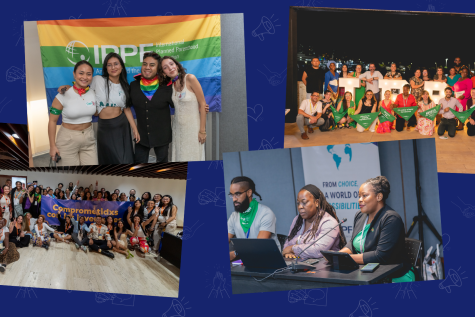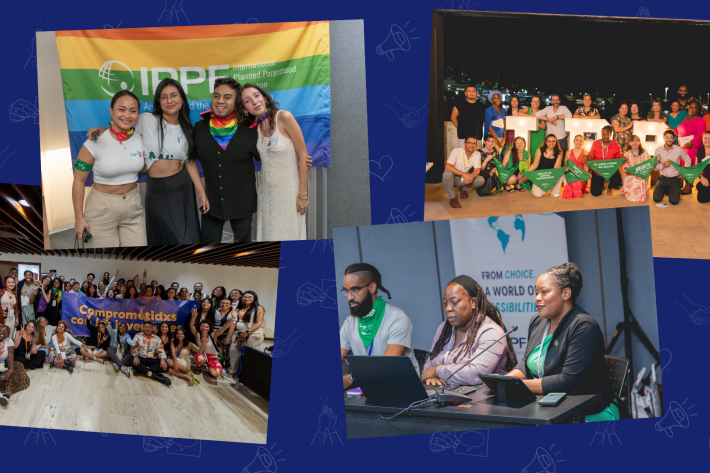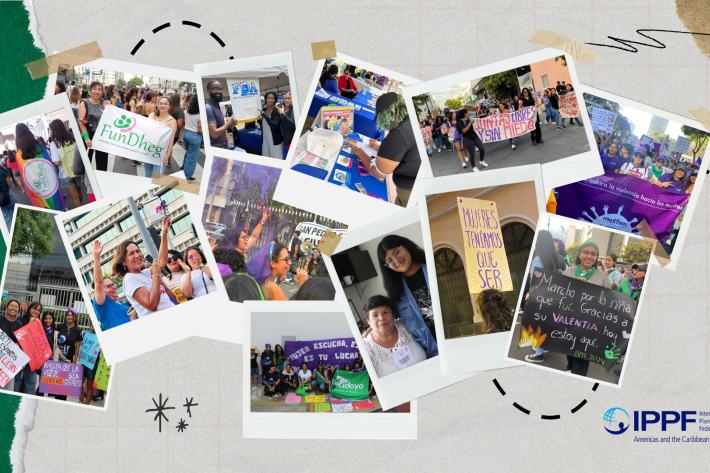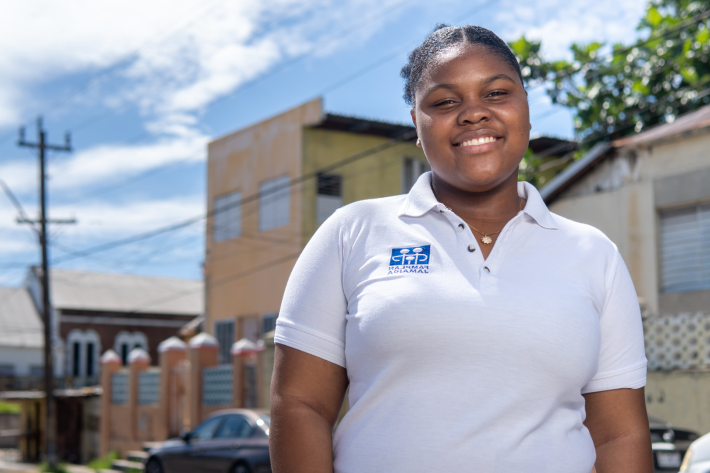Spotlight
A selection of stories from across the Federation

SRHR after Cartagena: the Pending Agenda for Population and Development
Our key highlights of the Conference on Population and Development 2024
Most Popular This Week
Brazil

The High-Level Political Forum: Let’s rewrite the rules
Haz click aquí para leer esta historia en español. The High-Level Political Foru

SRHR after Cartagena: the Pending Agenda for Population and Development
Haz click aquí para leer esta historia en espa
Americas & the Caribbean

Trinidad and Tobago, Colombia, St Lucia

Revolutionizing CSE: Latin American and Caribbean Youth Leading the Charge!
Revolutionizing CSE: Latin American and Caribbean Youth Leading the Charge!
Jamaica

I’ve seen people become more aware and more careful.
Candice Taylor, 18, joined the Jamaica Family Planning Association (JFPA) Youth Advocacy Movement (YAM) at age 15 after youth officer Fiona Francis introduced her to the group.
Filter our stories by:


| 18 July 2024
The High-Level Political Forum: Let’s rewrite the rules
Haz click aquí para leer esta historia en español. The High-Level Political Forum: Let’s rewrite the rules From Monday, July 8th, to Wednesday, July 17th, IPPF ACRO, in collaboration with Gestos, our partner organization in Brazil, participated in the United Nations High-Level Political Forum, to continue advocating for increased investment by governments in initiatives that are centered on and led by marginalized communities. The High-Level Political Forum (HLPF) serves as a critical platform for member-states, UN agencies, and civil society to evaluate progress, address challenges, exchange best practices, and promote policies aimed at achieving the Sustainable Development Goals (SDGs). This year it represents a significant advocacy opportunity to engage with the roadmap leading to the Summit of the Future, a pivotal United Nations debate scheduled for September, and offers a chance to enhance collaboration on essential issues around women and youth’s rights, in their diversity, and address gaps in global governance. The 2030 Agenda and its Sustainable Development Goals (SDGs) are deeply intertwined with the mission and objectives of IPPF as a Federation. Achieving reproductive justice globally requires that women, girls, and all individuals have control over their sexuality, gender, and reproduction. However, for this to become a reality, the basic human rights of all must be guaranteed and protected, including the right to a healthy environment. And only by making progress toward achieving the 17 SDGs, we can move closer to realizing this vision. As a monitoring body for the SDGs, during the High-Level Political Forums, governments present their National Volunteer Reports (VNRs). This facilitates the sharing of experiences, including successes, challenges, and lessons learned, with the aim of accelerating the implementation of the 2030 Agenda. In 2024, eight countries from our region—Belize, Brazil, Colombia, Costa Rica, Ecuador, Honduras, Mexico, and Peru—presented their VNRs. These reviews enable civil society, including IPPF ACRO, to closely monitor how governments have progressed in advancing the Sustainable Development Agenda, particularly in relation to the populations we work with, such as women, youth, LGBTQI+ individuals, sex workers, and other marginalized communities. Gestos- HIV, Communication and Gender, IPPF Collaborative Partner in Brazil, is the Latin America and the Caribbean Operative Partner of the Women’s Major Group and has been following the Agenda 2030 roadmap closely, as part of their country’s official delegation. For Germana Aciolly, journalist and policy adviser at Gestos, this is a special year. Brazil is presenting their VNR for the second time and it responds directly to the reports that the Civil Society Working Group for the 2030 Agenda in Brazil has been publishing since 2017. “There is no VNR presented here with such a level of democratic dialogue between civil society and government. This is an important example because, at the same time, we are here to launch our own CSO Spotlight Report that monitors all SDG targets and, unfortunately, it shows that in Brazil only around 7% of the goals are making satisfactory progress. It opens the opportunity, for instance, to debate with the government the immense challenges for women and youth, in all their diversity, in our country that particularly increased by the actions from the previous government.”

| 18 July 2024
The High-Level Political Forum: Let’s rewrite the rules
Haz click aquí para leer esta historia en español. The High-Level Political Forum: Let’s rewrite the rules From Monday, July 8th, to Wednesday, July 17th, IPPF ACRO, in collaboration with Gestos, our partner organization in Brazil, participated in the United Nations High-Level Political Forum, to continue advocating for increased investment by governments in initiatives that are centered on and led by marginalized communities. The High-Level Political Forum (HLPF) serves as a critical platform for member-states, UN agencies, and civil society to evaluate progress, address challenges, exchange best practices, and promote policies aimed at achieving the Sustainable Development Goals (SDGs). This year it represents a significant advocacy opportunity to engage with the roadmap leading to the Summit of the Future, a pivotal United Nations debate scheduled for September, and offers a chance to enhance collaboration on essential issues around women and youth’s rights, in their diversity, and address gaps in global governance. The 2030 Agenda and its Sustainable Development Goals (SDGs) are deeply intertwined with the mission and objectives of IPPF as a Federation. Achieving reproductive justice globally requires that women, girls, and all individuals have control over their sexuality, gender, and reproduction. However, for this to become a reality, the basic human rights of all must be guaranteed and protected, including the right to a healthy environment. And only by making progress toward achieving the 17 SDGs, we can move closer to realizing this vision. As a monitoring body for the SDGs, during the High-Level Political Forums, governments present their National Volunteer Reports (VNRs). This facilitates the sharing of experiences, including successes, challenges, and lessons learned, with the aim of accelerating the implementation of the 2030 Agenda. In 2024, eight countries from our region—Belize, Brazil, Colombia, Costa Rica, Ecuador, Honduras, Mexico, and Peru—presented their VNRs. These reviews enable civil society, including IPPF ACRO, to closely monitor how governments have progressed in advancing the Sustainable Development Agenda, particularly in relation to the populations we work with, such as women, youth, LGBTQI+ individuals, sex workers, and other marginalized communities. Gestos- HIV, Communication and Gender, IPPF Collaborative Partner in Brazil, is the Latin America and the Caribbean Operative Partner of the Women’s Major Group and has been following the Agenda 2030 roadmap closely, as part of their country’s official delegation. For Germana Aciolly, journalist and policy adviser at Gestos, this is a special year. Brazil is presenting their VNR for the second time and it responds directly to the reports that the Civil Society Working Group for the 2030 Agenda in Brazil has been publishing since 2017. “There is no VNR presented here with such a level of democratic dialogue between civil society and government. This is an important example because, at the same time, we are here to launch our own CSO Spotlight Report that monitors all SDG targets and, unfortunately, it shows that in Brazil only around 7% of the goals are making satisfactory progress. It opens the opportunity, for instance, to debate with the government the immense challenges for women and youth, in all their diversity, in our country that particularly increased by the actions from the previous government.”

| 18 July 2024
The High-Level Political Forum: Let’s rewrite the rules
Haz click aquí para leer esta historia en español. The High-Level Political Forum: Let’s rewrite the rules From Monday, July 8th, to Wednesday, July 17th, IPPF ACRO, in collaboration with Gestos, our partner organization in Brazil, participated in the United Nations High-Level Political Forum, to continue advocating for increased investment by governments in initiatives that are centered on and led by marginalized communities. The High-Level Political Forum (HLPF) serves as a critical platform for member-states, UN agencies, and civil society to evaluate progress, address challenges, exchange best practices, and promote policies aimed at achieving the Sustainable Development Goals (SDGs). This year it represents a significant advocacy opportunity to engage with the roadmap leading to the Summit of the Future, a pivotal United Nations debate scheduled for September, and offers a chance to enhance collaboration on essential issues around women and youth’s rights, in their diversity, and address gaps in global governance. The 2030 Agenda and its Sustainable Development Goals (SDGs) are deeply intertwined with the mission and objectives of IPPF as a Federation. Achieving reproductive justice globally requires that women, girls, and all individuals have control over their sexuality, gender, and reproduction. However, for this to become a reality, the basic human rights of all must be guaranteed and protected, including the right to a healthy environment. And only by making progress toward achieving the 17 SDGs, we can move closer to realizing this vision. As a monitoring body for the SDGs, during the High-Level Political Forums, governments present their National Volunteer Reports (VNRs). This facilitates the sharing of experiences, including successes, challenges, and lessons learned, with the aim of accelerating the implementation of the 2030 Agenda. In 2024, eight countries from our region—Belize, Brazil, Colombia, Costa Rica, Ecuador, Honduras, Mexico, and Peru—presented their VNRs. These reviews enable civil society, including IPPF ACRO, to closely monitor how governments have progressed in advancing the Sustainable Development Agenda, particularly in relation to the populations we work with, such as women, youth, LGBTQI+ individuals, sex workers, and other marginalized communities. Gestos- HIV, Communication and Gender, IPPF Collaborative Partner in Brazil, is the Latin America and the Caribbean Operative Partner of the Women’s Major Group and has been following the Agenda 2030 roadmap closely, as part of their country’s official delegation. For Germana Aciolly, journalist and policy adviser at Gestos, this is a special year. Brazil is presenting their VNR for the second time and it responds directly to the reports that the Civil Society Working Group for the 2030 Agenda in Brazil has been publishing since 2017. “There is no VNR presented here with such a level of democratic dialogue between civil society and government. This is an important example because, at the same time, we are here to launch our own CSO Spotlight Report that monitors all SDG targets and, unfortunately, it shows that in Brazil only around 7% of the goals are making satisfactory progress. It opens the opportunity, for instance, to debate with the government the immense challenges for women and youth, in all their diversity, in our country that particularly increased by the actions from the previous government.”

| 18 July 2024
The High-Level Political Forum: Let’s rewrite the rules
Haz click aquí para leer esta historia en español. The High-Level Political Forum: Let’s rewrite the rules From Monday, July 8th, to Wednesday, July 17th, IPPF ACRO, in collaboration with Gestos, our partner organization in Brazil, participated in the United Nations High-Level Political Forum, to continue advocating for increased investment by governments in initiatives that are centered on and led by marginalized communities. The High-Level Political Forum (HLPF) serves as a critical platform for member-states, UN agencies, and civil society to evaluate progress, address challenges, exchange best practices, and promote policies aimed at achieving the Sustainable Development Goals (SDGs). This year it represents a significant advocacy opportunity to engage with the roadmap leading to the Summit of the Future, a pivotal United Nations debate scheduled for September, and offers a chance to enhance collaboration on essential issues around women and youth’s rights, in their diversity, and address gaps in global governance. The 2030 Agenda and its Sustainable Development Goals (SDGs) are deeply intertwined with the mission and objectives of IPPF as a Federation. Achieving reproductive justice globally requires that women, girls, and all individuals have control over their sexuality, gender, and reproduction. However, for this to become a reality, the basic human rights of all must be guaranteed and protected, including the right to a healthy environment. And only by making progress toward achieving the 17 SDGs, we can move closer to realizing this vision. As a monitoring body for the SDGs, during the High-Level Political Forums, governments present their National Volunteer Reports (VNRs). This facilitates the sharing of experiences, including successes, challenges, and lessons learned, with the aim of accelerating the implementation of the 2030 Agenda. In 2024, eight countries from our region—Belize, Brazil, Colombia, Costa Rica, Ecuador, Honduras, Mexico, and Peru—presented their VNRs. These reviews enable civil society, including IPPF ACRO, to closely monitor how governments have progressed in advancing the Sustainable Development Agenda, particularly in relation to the populations we work with, such as women, youth, LGBTQI+ individuals, sex workers, and other marginalized communities. Gestos- HIV, Communication and Gender, IPPF Collaborative Partner in Brazil, is the Latin America and the Caribbean Operative Partner of the Women’s Major Group and has been following the Agenda 2030 roadmap closely, as part of their country’s official delegation. For Germana Aciolly, journalist and policy adviser at Gestos, this is a special year. Brazil is presenting their VNR for the second time and it responds directly to the reports that the Civil Society Working Group for the 2030 Agenda in Brazil has been publishing since 2017. “There is no VNR presented here with such a level of democratic dialogue between civil society and government. This is an important example because, at the same time, we are here to launch our own CSO Spotlight Report that monitors all SDG targets and, unfortunately, it shows that in Brazil only around 7% of the goals are making satisfactory progress. It opens the opportunity, for instance, to debate with the government the immense challenges for women and youth, in all their diversity, in our country that particularly increased by the actions from the previous government.”









